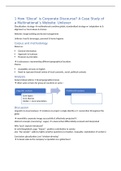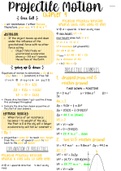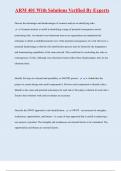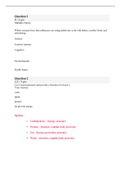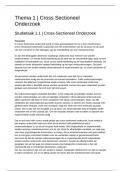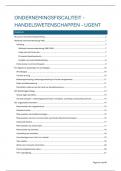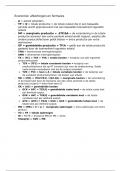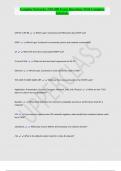1 How ‘Glocal’ is Corporate Discourse? A Case Study of
a Multinational’s Website: Unilever
Glocalization: strategy multinationals combine global, standardized strategy w/ adaptation to &
alignment w/ local values & choices
Website: image building and brand management
Unilever: food & beverages, personal & home hygiene
Corpus and methodology
About us:
General information
Approach to business
Purposes & principles
6 subcorpora: representing different geographical locations
Choice:
Availability versions in English
Need to represent broad variety of local economic, social, political contexts
Analysis
General observations: 5 broad geographical areas
often same version for group of countries in same ~
Linguistic analysis Multimodal analysis
Core topics
Core themes
Global <> local orientation
Discussion
Linguistic & visual analyses tendency to project a single identity o/t corporation throughout the
globe
monolithic corporate image successfully & effectively projected if:
abstract concepts (convincing ! vague) universal but differentially received and interpreted
Why ‘local’ aspects introduced?
bv only Bangladesh: page “Impact”: positive contribution to society
also “Our people”: address highly sensitive questions (corruption, inequality, exploitation of workers)
Conclusion: glocalization: just “window-dressing”
to boost sales & the company’s reputation at a global level
, Vragen tijdens de les
Wat betekent ‘glocalization’?
Samentrekking van globalisation en local
wereldwijde uniformisering, maar tegelijk ook aanpassen aan lokale markten
(diversificatie op maat van culturele, nationale deelmarkten en lokale contexten)
Wat is de traditionele visie van multinationals op corporate
communication?
Monolitisch: één identiteit, één imago (van het bedrijf)
zendergerichte aanpak (vanuit degene die op de markt komt) zou moeten veranderen in een meer
doelgerichte aanpak (aanpassen aan de markten)
Waarom focust deze studie op de communicatie via websites?
Makkelijk aan te passen en te vergelijken: operationele haalbaarheid
Vormen een fundamenteel kanaal voor die bedrijfscommunicatie
Belangrijk tool voor het bouwen van hun imago
Ze zijn wereldomvattend (uiting van het homogene monolitische) + houden in dat je kan
diversifiëren
Formuleer de onderzoeksvraag van de casestudy
Op welke manier past Unilever de glocalization strategie toe op haar website?
Wat is het belangrijkste resultaat van het onderzoek?
De verschillen zijn er, maar blijven heel erg beperkt (inhoudelijk verandert er weinig)
Nog altijd homogeen en monolitisch bedacht en wordt zo uitgedragen
Het onderzoek bevestigt de gedachte dat glocalization schone schijn is: het is niet enkel om meer
te verkopen, maar ook om globaal een goede reputatie te hebben als bedrijf
Kan je een link leggen tussen de metafoor van ‘the global village’ en de
manier waarop een multinational als Unilever ‘glocalization’ via de eigen
website wel en niet realiseert?
Doen alsof het een dorp is, is makkelijker dan het besef dat het eigenlijk niet zo gelijk is etc. Dat de
wereld een mondiaal dorp is, wil niet zeggen dat er een homogene cultuur ontstaat in de wereld.
Verschillen blijven bestaan en met glocalization wordt hier aandacht aan geschonken.
Beschrijf de specifiek wetenschappelijke opbouw van dit artikel
Begin van het artikel: aandacht besteden aan wat al aan onderzoek is gebeurd (= ‘literatuur’)
Onderzoeksvraag: wat is de bedoeling van het onderzoek (= inleiding)
Methodologie: hoe en waarom je dingen doet
(onderzoek moet repliceerbaar zijn hetzelfde resultaat moet bekomen worden wanneer het
onderzoek nog eens uitgevoerd wordt)
Analyse van de resultaten
Discussie: over belangrijke conclusies die getrokken worden uit het onderzoek:
wat is relevant en wat is niet relevant? Wat is de conclusie? Wat komt overeen en wat komt niet
overeen?
Discussie keert terug naar de onderzoeksvraag die expliciet beantwoord wordt
heel angelsaksische manier van structureren: alles expliciet en rechtlijnig
a Multinational’s Website: Unilever
Glocalization: strategy multinationals combine global, standardized strategy w/ adaptation to &
alignment w/ local values & choices
Website: image building and brand management
Unilever: food & beverages, personal & home hygiene
Corpus and methodology
About us:
General information
Approach to business
Purposes & principles
6 subcorpora: representing different geographical locations
Choice:
Availability versions in English
Need to represent broad variety of local economic, social, political contexts
Analysis
General observations: 5 broad geographical areas
often same version for group of countries in same ~
Linguistic analysis Multimodal analysis
Core topics
Core themes
Global <> local orientation
Discussion
Linguistic & visual analyses tendency to project a single identity o/t corporation throughout the
globe
monolithic corporate image successfully & effectively projected if:
abstract concepts (convincing ! vague) universal but differentially received and interpreted
Why ‘local’ aspects introduced?
bv only Bangladesh: page “Impact”: positive contribution to society
also “Our people”: address highly sensitive questions (corruption, inequality, exploitation of workers)
Conclusion: glocalization: just “window-dressing”
to boost sales & the company’s reputation at a global level
, Vragen tijdens de les
Wat betekent ‘glocalization’?
Samentrekking van globalisation en local
wereldwijde uniformisering, maar tegelijk ook aanpassen aan lokale markten
(diversificatie op maat van culturele, nationale deelmarkten en lokale contexten)
Wat is de traditionele visie van multinationals op corporate
communication?
Monolitisch: één identiteit, één imago (van het bedrijf)
zendergerichte aanpak (vanuit degene die op de markt komt) zou moeten veranderen in een meer
doelgerichte aanpak (aanpassen aan de markten)
Waarom focust deze studie op de communicatie via websites?
Makkelijk aan te passen en te vergelijken: operationele haalbaarheid
Vormen een fundamenteel kanaal voor die bedrijfscommunicatie
Belangrijk tool voor het bouwen van hun imago
Ze zijn wereldomvattend (uiting van het homogene monolitische) + houden in dat je kan
diversifiëren
Formuleer de onderzoeksvraag van de casestudy
Op welke manier past Unilever de glocalization strategie toe op haar website?
Wat is het belangrijkste resultaat van het onderzoek?
De verschillen zijn er, maar blijven heel erg beperkt (inhoudelijk verandert er weinig)
Nog altijd homogeen en monolitisch bedacht en wordt zo uitgedragen
Het onderzoek bevestigt de gedachte dat glocalization schone schijn is: het is niet enkel om meer
te verkopen, maar ook om globaal een goede reputatie te hebben als bedrijf
Kan je een link leggen tussen de metafoor van ‘the global village’ en de
manier waarop een multinational als Unilever ‘glocalization’ via de eigen
website wel en niet realiseert?
Doen alsof het een dorp is, is makkelijker dan het besef dat het eigenlijk niet zo gelijk is etc. Dat de
wereld een mondiaal dorp is, wil niet zeggen dat er een homogene cultuur ontstaat in de wereld.
Verschillen blijven bestaan en met glocalization wordt hier aandacht aan geschonken.
Beschrijf de specifiek wetenschappelijke opbouw van dit artikel
Begin van het artikel: aandacht besteden aan wat al aan onderzoek is gebeurd (= ‘literatuur’)
Onderzoeksvraag: wat is de bedoeling van het onderzoek (= inleiding)
Methodologie: hoe en waarom je dingen doet
(onderzoek moet repliceerbaar zijn hetzelfde resultaat moet bekomen worden wanneer het
onderzoek nog eens uitgevoerd wordt)
Analyse van de resultaten
Discussie: over belangrijke conclusies die getrokken worden uit het onderzoek:
wat is relevant en wat is niet relevant? Wat is de conclusie? Wat komt overeen en wat komt niet
overeen?
Discussie keert terug naar de onderzoeksvraag die expliciet beantwoord wordt
heel angelsaksische manier van structureren: alles expliciet en rechtlijnig

